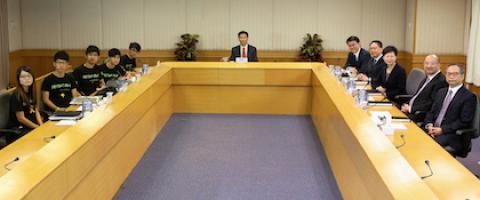The government and student leaders remain poles apart on how the city should elect its leader in 2017, after their televised talks yesterday failed to resolve the issues that triggered the Occupy Central mass sit-ins.
Chief Secretary Carrie Lam Cheng Yuet-ngor said the government would submit a report to Beijing reflecting the latest public sentiment and would consider setting up a platform for dialogue on constitutional development. But that failed to please the five leaders from the Federation of Students.
Lam and fellow officials ruled out the possibility of reversing the National People's Congress Standing Committee's August decision imposing tight limits on the 2017 election. They also rejected the students' demand for public nomination of candidates.
Lam called on protesters to withdraw, but federation leaders said they would not retreat as the government had not given any concrete response.
Lam said the government respected the students' passion in pursuing democracy, but added: "However respectful one's ideal is, it should be achieved by reasonable and lawful ways."
Tens of thousands of people at the protest sites in Admiralty, Causeway Bay and Mong Kok watched the televised talks - the first face-to-face dialogue between top officials and activists in the city's history.
The two-hour meeting was broadcast by mainland and overseas news organisations. CCTV's 24-hour news channel ran a couple of minutes of the debate live.
Lam said the government would submit a report to the State Council's Hong Kong and Macau Affairs Office to "reflect what had happened in Hong Kong and the concerns of different sectors" since the Standing Committee's announcement that only two or three candidates could run for chief executive in 2017 and they must win majority support from a 1,200-strong nominating committee.
"The report will serve as a crucial reference for constitutional development in future," she said.
Lam stressed arrangements for electing the city's leader could be amended after universal suffrage was attained in 2017.
There was also room to make the election more democratic within the restrictive framework, she said.
Hong Kong was not an independent entity, but only a special administrative region, she said. "It cannot decide on its own its political development."
At the end of the talks, Lam said they had been constructive. "There was no quarrel and no confrontation. I hope this is not the only time we meet."
The federation's deputy secretary general, Lester Shum, rejected Lam's call for the protesters to end their sit-in.
"Have we not made enough concessions? So many young people … are even willing to be arrested and go to jail," he said. "What do we want? The right to vote and the right to stand in elections. Now the government is only telling us to pack up and go home."
Occupy co-organiser Benny Tai Yiu-ting said protesters would not accept the government's response. The new report should be submitted to the NPC Standing Committee, not the State Council, so that it could retract its August decision, he said.
Federation secretary general Alex Chow Yong-kang noted no date was fixed for the next round of talks. He said the students would assess public response to the government's proposals before deciding on their next step.
Protesters in Admiralty said submitting a new report raised more questions than answers.
"What kind of public opinions are you expecting Lam to include in the report," Siu Chi-yan, a second-year student at the Academy of Performing Arts, asked.
Executive councillor Starry Lee Wai-king said it appeared the students did not fully understand the principles of "one country, two systems" and the Basic Law.
Robert Chow Yung, convenor of the Alliance for Peace and Democracy, said he doubted the dialogue would end the protests.
Meanwhile on Wednesday morning, a group of some 20 staff from the Citic Tower in Admiralty were thwarted by students in an attempt to remove barricades on Lung Wui Road.
The students ignored a warning that they were in contempt of court from a representative of Citic’s legal department and a plea to clear the barricades because they were blocking a fire escape route.
Students were later seen reinforcing barricades in front of the entrance to Citic Tower on Tim Mei Avenue, which had been taken down on Tuesday.
All the bank branches that were affected by the pro-democracy protests in Mong Kok have resumed operation after HSBC’s Nathan Road branch reopened on Wednesday.
Key points in Occupy Central talks
GOVERNMENT
The government is considering making an informal report to the State Council's Hong Kong and Macau Affairs Office reflecting people's views expressed during the democracy protest
The next round of reform consultation will focus on how to make the nominating committee for the 2017 chief executive poll more representative of the general populace
The election framework for 2017 is not final
A platform will be set up to gauge views on future constitutional changes after 2017
STUDENTS
The government's report to Beijing about the 2017 election did not accurately reflect the public's views on many aspects of electoral reform
The Chinese constitution would allow the National People's Congress Standing Committee to withdraw its electoral framework for Hong Kong
Hong Kong should amend the Basic Law to allow public nomination
The nominating committee is not representative of the general populace
[South China Morning Post staff reporters Tony Cheung, Jeffie Lam, Gary Cheung, Joyce Ng, Ng Kang-chung, Peter So, Amy Nip, Chris Lau and Alan Yu contributed to this report.]


Spread the word